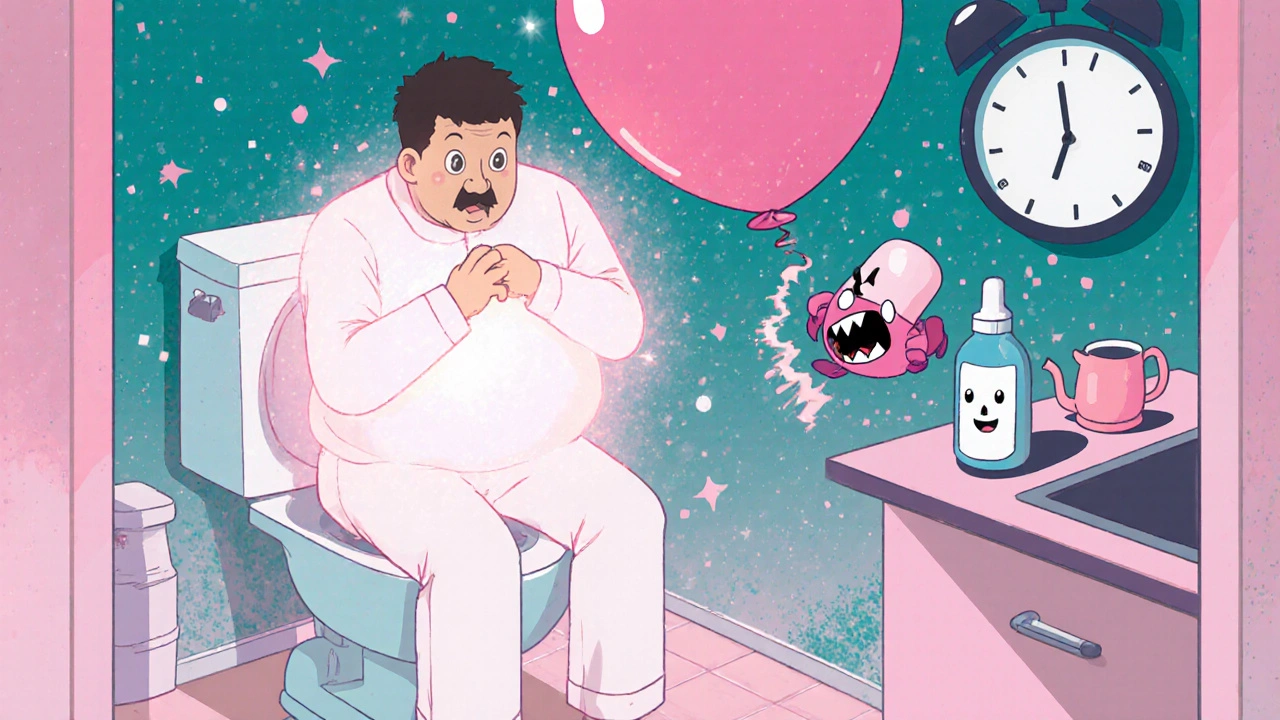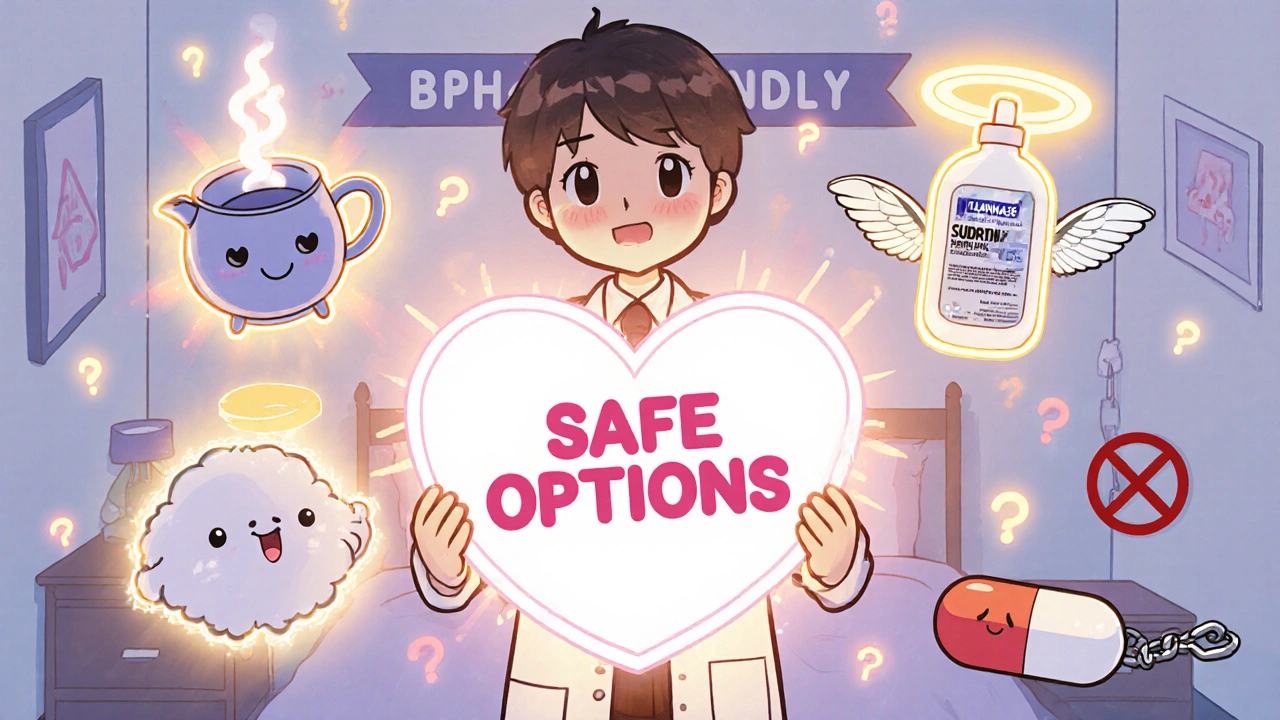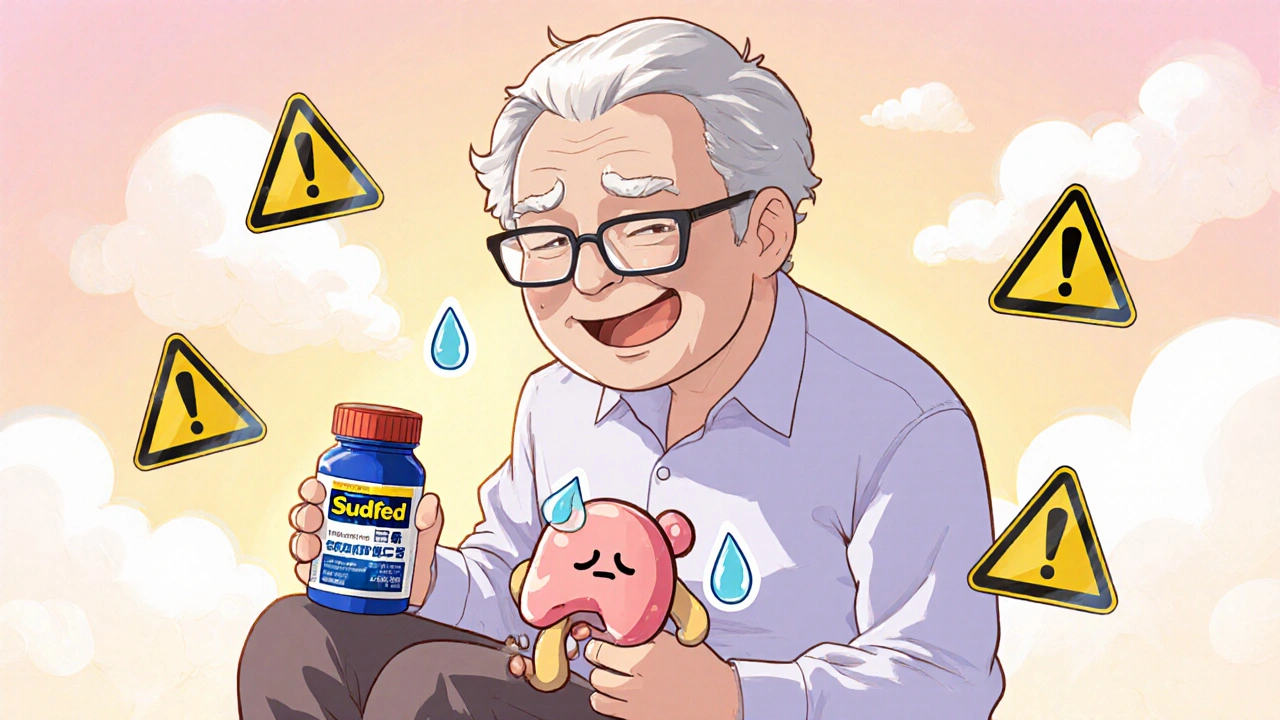BPH Decongestant Risk Calculator
Your Risk Assessment
This tool helps you understand your risk of urinary retention when taking decongestants with BPH. Based on your specific factors, it provides personalized risk levels and recommendations.
Men over 50 with an enlarged prostate-known as benign prostatic hyperplasia, or BPH-are often told to avoid certain cold and flu medicines. But why? The answer lies in a hidden danger: decongestants can trigger sudden, painful urinary retention, forcing some men to the emergency room. This isn’t a rare side effect. It’s a well-documented, preventable medical risk that thousands face every year.
What Is BPH, Really?
Benign prostatic hyperplasia isn’t cancer. It’s a normal part of aging for many men. By age 60, about half of all men have some degree of prostate enlargement. By 85, that number jumps to 90%. The prostate sits right below the bladder and wraps around the urethra-the tube that carries urine out of the body. As it grows, it squeezes the urethra, making it harder to start urinating, weakens the stream, and leaves a feeling that the bladder isn’t fully empty.
These symptoms aren’t just inconvenient-they’re disruptive to sleep, daily life, and mental health. Men with moderate to severe BPH (measured by an IPSS score above 12) often avoid social events, limit fluid intake, or wake up five or six times a night to pee. That’s why managing BPH isn’t just about medication-it’s about avoiding things that make it worse.
Why Decongestants Are Dangerous for BPH
Most over-the-counter decongestants-like Sudafed-contain pseudoephedrine. Some use phenylephrine instead. Both are alpha-adrenergic agonists. That’s a fancy way of saying they tighten muscles. In your nose, that’s good: it shrinks swollen blood vessels and clears congestion. But in the prostate and bladder neck? That’s a problem.
The prostate is made up of about 50% smooth muscle. When pseudoephedrine hits those muscles, they contract. Studies show this increases urethral resistance by 35-40%. Imagine trying to squeeze water through a straw that’s been pinched shut. That’s what happens inside the bladder. Urine can’t flow out, even if the bladder is full. And when that happens? Acute urinary retention.
This isn’t theoretical. A 2021 study in the Journal of Urology found that men with BPH who took pseudoephedrine were 2.8 times more likely to experience acute urinary retention. In men over 70, the risk jumps even higher. One NIH study showed 51.8% of older men with BPH developed subclinical voiding dysfunction after just one dose. That means their urine flow dropped, even if they didn’t feel completely blocked yet.
Not All Decongestants Are the Same
Pseudoephedrine is the worst offender. It’s absorbed fully into the bloodstream and lasts 12 to 16 hours. That’s a long time for your prostate to be under pressure. Phenylephrine, found in some newer cold pills, is slightly less risky-but still dangerous. It increases urethral resistance by 15-20%, enough to trigger symptoms in sensitive men.
Nasal sprays like oxymetazoline (Afrin) are different. They’re applied locally and don’t enter the bloodstream much. Studies show they carry a much lower risk-only a 1.25-fold increase in retention. That’s why many urologists say nasal sprays are safer than pills. But even then: don’t use them for more than three days. They can cause rebound congestion, which leads to more use-and more risk.
And what about antihistamines? Not all are safe. First-gen ones like diphenhydramine (Benadryl) have anticholinergic effects that can relax the bladder muscle, making it harder to empty. That’s another path to retention. But second-gen antihistamines like loratadine (Claritin) or cetirizine (Zyrtec) don’t do that. They’re a better choice if you need allergy relief.

Real Stories, Real Consequences
Reddit user u/BPH_Warrior took one 30mg tablet of pseudoephedrine for a stuffy nose. Within hours, he couldn’t urinate at all. His bladder swelled. He felt pain, panic, and pressure-but nothing came out. He ended up in the ER, catheterized for 48 hours. "I thought it was just a cold," he wrote. "I didn’t know a pill could lock my bladder shut."
On the Prostate Cancer Foundation forum, 76% of 187 men reported urinary problems after taking pseudoephedrine. Over 30% needed emergency catheterization. One man, 68, said he’d used Sudafed for years with no issues. But he’s the exception. Most aren’t so lucky.
Doctors see this all the time. Dr. J. Quentin Clemens at the University of Michigan found that 70% of men who developed acute urinary retention after decongestants needed a catheter for 2-3 days. That’s not just uncomfortable-it’s expensive, risky (infection, urethral damage), and emotionally traumatic.
What Should You Do Instead?
If you have BPH and need relief from congestion, there are safer options.
- Saline nasal irrigation: Using a neti pot or NeilMed Sinus Rinse flushes out mucus and allergens. A 2022 Cochrane Review found it effective in 68% of users-with zero urinary side effects.
- Intranasal corticosteroids: Fluticasone (Flonase) or mometasone (Nasonex) reduce nasal swelling without affecting the prostate. Studies show they work in 72% of cases.
- Steam inhalation: A simple bowl of hot water with a towel over your head can open nasal passages. No drugs. No risk.
- Loratadine or cetirizine: For allergies, these antihistamines are safe. Avoid diphenhydramine, chlorpheniramine, or any "PM" formula.
Many men don’t know these alternatives exist. Pharmacists often don’t ask about prostate health when selling cold medicine. That’s changing-but slowly.

When Decongestants Might Be Okay (With Caution)
Some experts say there’s a gray zone. Dr. Roger Dmochowski from Vanderbilt says occasional, low-dose pseudoephedrine (30mg or less) might be acceptable for men with very mild BPH (IPSS under 8) if they’re monitored. But even then, he recommends starting an alpha-blocker like tamsulosin 72 hours before. A 2022 Cleveland Clinic study showed this combo reduced retention risk by 85%.
But here’s the catch: most men don’t know their IPSS score. They don’t know if their symptoms are mild or severe. And they don’t know what tamsulosin is. So the safest rule is this: if you have BPH, avoid pseudoephedrine entirely.
What’s Being Done to Fix This?
The FDA required warning labels on all pseudoephedrine products in January 2022. Before that, only 28% of men knew about the risk. Now, it’s 63%. Still not enough.
The American Urological Association now includes decongestant screening as standard in BPH care. The American Pharmacists Association recommends pharmacists ask every man over 50: "Do you have trouble peeing?" before selling decongestants.
The European Association of Urology goes further: they recommend complete avoidance of all systemic alpha-agonists in men with BPH. And the American Geriatrics Society lists pseudoephedrine as a "potentially inappropriate medication" for men over 65.
Even Purdue Pharma is working on a solution. Their experimental drug PF-06943303 blocks only the bladder’s alpha receptors-not the prostate’s-so it prevents retention without killing congestion relief. Phase II trials showed 92% success. FDA Priority Review was granted in August 2023. It’s not on the market yet-but it’s coming.
Your Action Plan
If you have BPH, here’s what to do now:
- Check your meds. Look at every cold, flu, or allergy pill in your cabinet. If it says "pseudoephedrine" or "Sudafed," put it aside.
- Ask your doctor. If you’ve taken decongestants recently and noticed worse urinary symptoms, tell them. Ask for an IPSS score.
- Switch to safer options. Start with saline rinse. Then try Flonase. Use Claritin for allergies.
- Know the warning signs. If your stream suddenly weakens, you feel pressure but can’t pee, or your lower belly feels tight and swollen-stop all decongestants and call your urologist. Don’t wait.
- Follow the 48-hour rule. Never use any decongestant for more than two days without talking to a doctor.
This isn’t about fear. It’s about awareness. BPH is common. Decongestants are everywhere. But the link between them is deadly serious. You don’t need to suffer through a cold or allergy season with a blocked bladder. There are better ways. You just need to know them.
Can pseudoephedrine cause permanent damage to the prostate?
No, pseudoephedrine doesn’t cause permanent damage to the prostate itself. But it can cause acute urinary retention, which, if left untreated, may lead to bladder damage, urinary tract infections, or kidney issues. The prostate doesn’t grow faster because of decongestants-it just gets temporarily tighter. Once the drug leaves your system, the prostate relaxes again. The danger is in the sudden blockage, not long-term tissue changes.
Is phenylephrine safer than pseudoephedrine for men with BPH?
It’s slightly safer, but still risky. Phenylephrine increases urethral resistance by 15-20%, compared to 35-40% for pseudoephedrine. That means it’s less likely to cause full retention-but not impossible. Many men with moderate to severe BPH still experience symptoms after taking phenylephrine. It’s not a safe alternative-it’s a less dangerous one. Better options exist.
Can I take Sudafed if I’m on tamsulosin?
Even if you’re on tamsulosin, taking pseudoephedrine is not recommended. While studies show combining them reduces retention risk by 85%, that still leaves a 15% chance of problems. Tamsulosin helps relax the prostate, but it doesn’t fully block the powerful muscle-contracting effect of pseudoephedrine. Most urologists advise avoiding pseudoephedrine entirely-even with alpha-blockers-because the risk isn’t zero.
Why do some men say they’ve used pseudoephedrine for years with no issues?
Because everyone’s prostate is different. Some men have mild enlargement with low muscle tone, so decongestants don’t trigger retention. Others have dense, tight muscle tissue that reacts strongly. Age, genetics, and how much the prostate has grown all play a role. But just because it worked for you once doesn’t mean it’s safe. Risk increases with age and symptom severity. One bad reaction can happen after years of no problems.
Should I avoid all over-the-counter cold medicines if I have BPH?
Not all-just the ones with pseudoephedrine or phenylephrine. Check the label. Many "multi-symptom" cold pills combine decongestants with pain relievers and antihistamines. Look for products labeled "non-drowsy" or "without decongestant." Stick to single-ingredient options like acetaminophen for pain and loratadine for allergies. Saline rinses and steam are your best friends.
What should I do if I accidentally took a decongestant and can’t urinate?
If you can’t urinate at all and feel pressure or pain in your lower belly, go to the ER immediately. Don’t wait. Don’t drink more water. Don’t try to force it. Acute urinary retention is a medical emergency. You’ll likely need a catheter to drain your bladder. Once your bladder is empty, the symptoms will ease. Tell the staff you took a decongestant and have BPH-that helps them act faster.







Michelle N Allen
November 29, 2025So basically if you got a cold you gotta suffer through it because some pill might make you pee yourself